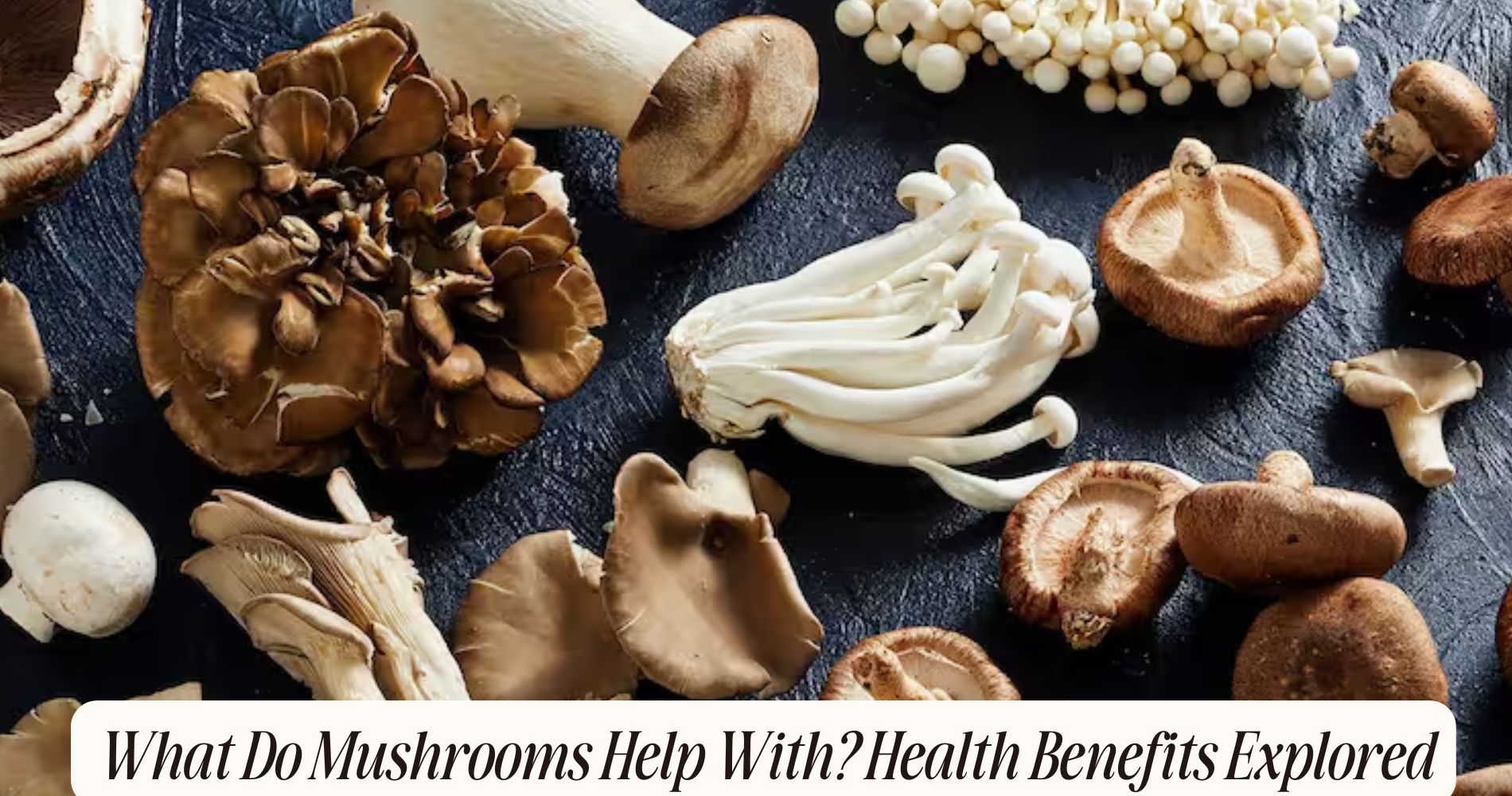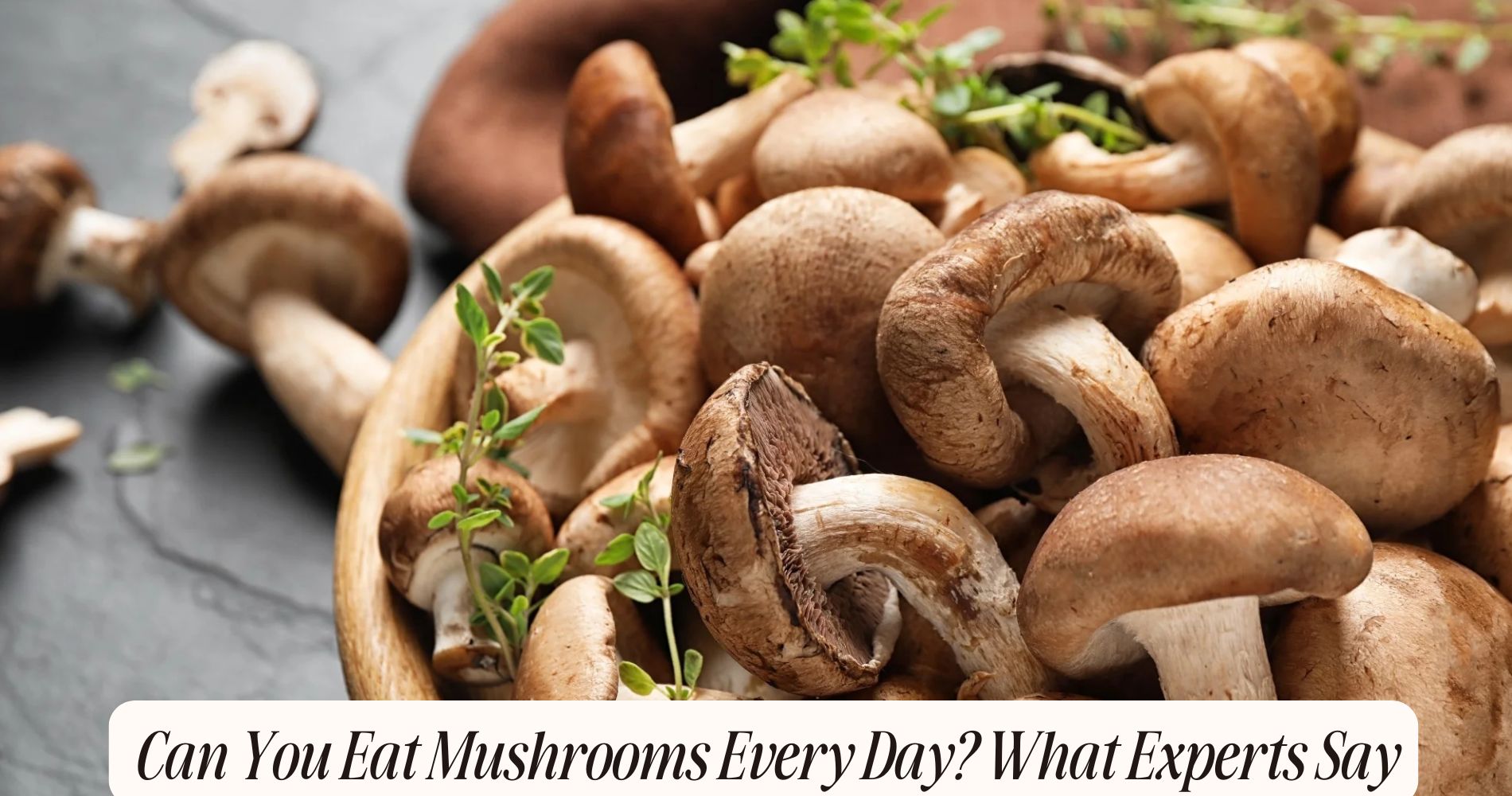
What Do Mushrooms Help With? Health Benefits Explored
Nutritional Value of Mushrooms
Many people mightn't realize just how nutritious mushrooms can be. Packed with vitamins, minerals, and antioxidants, these fungi are a powerhouse for your health. Numerous mushroom varieties, such as shiitake, portobello, and cremini, offer distinct flavor profiles and culinary uses, enhancing any dish while providing essential nutrients.
When you use proper cooking techniques, like sautéing or grilling, you can maximize their taste and nutritional benefits. Plus, mushrooms are low in calories and high in fiber, making them a fantastic addition to a balanced diet.

Don't forget to follow storage tips—keep them in a cool, dark place to maintain freshness.
For those interested in their myriad benefits, mushroom supplements are gaining popularity for their potential medicinal applications. They may support overall wellness, thanks to their bioactive compounds.
If you're feeling adventurous, consider foraging practices to find wild mushrooms, but always verify you know which varieties are safe to eat.
Incorporating mushrooms into your meals not only elevates flavors but also contributes to a nutrient-rich diet that can boost your health considerably.
Immune System Support
Mushrooms pack a punch when it comes to immune system support, thanks to their nutrient-rich compounds.
They're loaded with antioxidants that help combat oxidative stress and promote overall health.
Plus, their connection to gut health can enhance your immune response, making them a smart addition to your diet.
Nutrient-Rich Compounds
Over the years, researchers have uncovered a wealth of nutrient-rich compounds in mushrooms that provide substantial support for the immune system. Different mushroom varieties, such as shiitake, reishi, and maitake, are particularly noted for their immune-boosting properties. They contain polysaccharides, specifically beta-glucans, which can enhance your body's immune response. These compounds stimulate the activity of white blood cells, helping your body fend off infections more effectively.
Additionally, mushrooms are packed with vitamins and minerals, including vitamin D, selenium, and zinc, essential for peak immune function. By including these nutrient-dense foods in your diet, you can improve nutrient absorption, ensuring your body gets the most benefit from the food you consume.
Moreover, the anti-inflammatory properties found in certain mushroom varieties also contribute to a balanced immune system, reducing the risk of chronic diseases. Incorporating a variety of mushrooms into your meals can be an easy and effective way to bolster your immunity while enjoying their unique flavors.
Antioxidant Properties
Antioxidant power plays an essential role in supporting your immune system, and certain mushrooms are rich sources of these beneficial compounds. Varieties like shiitake, maitake, and reishi contain high levels of antioxidants, which help combat oxidative stress in your body.
This oxidative stress can lead to inflammation and weaken your immune response, so incorporating these mushrooms into your diet can be a smart move.

When you cook with mushrooms, the preparation methods can also influence their antioxidant levels. Sautéing or grilling mushrooms can enhance their flavor while preserving their nutrients, making your meals both delicious and healthful.
On the other hand, boiling might reduce some of these beneficial compounds, so it's best to avoid that method if you're aiming for maximum antioxidant intake.
Gut Health Connection
A healthy gut is fundamental for a robust immune system, and certain mushrooms can play a vital role in maintaining gut health. These fungi, like shiitake and reishi, contain compounds that support microbiome balance. A well-balanced microbiome contributes to your immune defenses by fostering beneficial bacteria while inhibiting harmful pathogens.
Mushrooms are rich in polysaccharides, which can enhance the production of digestive enzymes. These enzymes help break down food efficiently, allowing your body to absorb nutrients more effectively. When your digestive system functions effectively, your immune system receives the support it needs to combat infections and diseases.
Research indicates that mushrooms can also modulate immune responses, helping to prevent overreactions that can lead to inflammation. This anti-inflammatory effect is essential for maintaining a healthy gut lining, which acts as a barrier against harmful substances.
Incorporating mushrooms into your diet can be an excellent strategy for promoting gut health and, consequently, immune system support. By ensuring microbiome balance and boosting digestive enzymes, you're taking significant steps towards a healthier you.
Antioxidant Properties
Mushrooms are packed with antioxidants that help reduce free radicals in your body, which can lower oxidative stress.
By incorporating them into your diet, you're not only boosting your overall health but also supporting your immune system.
This powerful combination makes mushrooms a valuable addition to your nutritional routine.
Free Radical Reduction
Harnessing the power of free radical reduction, certain mushrooms stand out for their remarkable antioxidant properties. These mushroom varieties, such as shiitake, reishi, and maitake, contain high levels of compounds that combat oxidative stress in your body.

Free radicals, unstable molecules that can cause cellular damage, are linked to various chronic diseases and aging. By incorporating these mushrooms into your diet, you can greatly enhance your antioxidant intake.
Studies have shown that the polysaccharides and phenolic compounds found in these mushrooms neutralize free radicals, reducing their harmful effects. For instance, shiitake mushrooms are rich in ergothioneine, an antioxidant that protects your cells from oxidative damage.
Reishi mushrooms, known for their medicinal properties, also contribute to free radical reduction, potentially lowering the risk of heart disease and improving overall health. Maitake mushrooms offer similar benefits, with studies indicating they help boost your body's antioxidant defenses.
Immune System Support
Incorporating certain mushrooms into your diet can considerably bolster your immune system, thanks in part to their impressive antioxidant properties.
Mushroom varieties such as shiitake, reishi, and maitake are particularly notable for their ability to enhance immune function. These mushrooms contain bioactive compounds like polysaccharides and beta-glucans, which act as powerful immune boosters.
Research shows that these compounds stimulate the production of immune cells, such as macrophages and natural killer cells, which play a critical role in defending your body against infections.
Additionally, the antioxidants found in these mushrooms help neutralize free radicals, reducing oxidative stress and inflammation—two factors that can weaken your immune response.
Regularly including these mushrooms in your meals, whether in soups, stir-fries, or salads, can provide a delicious way to enhance your overall health.
By choosing a variety of mushrooms, you not only diversify your diet but also maximize the different health benefits they offer.
Heart Health Benefits
Rich in nutrients and compounds beneficial for cardiovascular health, mushrooms can play an essential role in heart health. These fungi are low in calories and packed with fiber, which can aid in cholesterol reduction. Studies show that certain varieties, like shiitake and oyster mushrooms, contain compounds that may help lower LDL cholesterol levels, reducing your risk of heart disease.
Moreover, mushrooms are rich in potassium, a mineral known for its role in blood pressure regulation. By including mushrooms in your diet, you can help maintain healthy blood pressure levels, which is vital for overall cardiovascular wellness.
The antioxidants found in mushrooms, such as ergothioneine, also contribute to heart health by combating oxidative stress, a factor linked to heart problems.
Incorporating a variety of mushrooms into your meals not only enhances flavor but also supports your heart health. Whether sautéed, grilled, or added to soups, these versatile ingredients can easily fit into your diet.
Weight Management
Mushrooms can be a valuable addition to your weight management strategy due to their low calorie count and high fiber content. With a low caloric density, mushrooms allow you to enjoy larger portions without consuming excess calories, making it easier to practice portion control.
Their dietary fiber is essential for appetite regulation, helping you feel fuller for longer and enhancing satiety, which is vital for successful weight loss.

Incorporating mushrooms into your meals can also provide a metabolic boost. Their unique compounds may help improve nutrient absorption and optimize your metabolism, which supports your weight management goals.
Additionally, mushrooms make for excellent healthy snacking options. You can sauté them, add them to salads, or even enjoy them raw, providing a nutritious alternative to high-calorie snacks.
Mental Health Improvement
Recent studies suggest that mushrooms may play a beneficial role in mental health improvement. Specific mushroom varieties, such as lion's mane and reishi, have garnered attention for their potential cognitive benefits.
Lion's mane, in particular, is known for compounds that may stimulate nerve growth factor (NGF), which supports brain health and mental clarity. Research indicates that incorporating these mushrooms into your diet could enhance memory and focus. For example, participants consuming lion's mane showed improved cognitive performance compared to those who didn't.
Reishi mushrooms, on the other hand, may help reduce stress and anxiety, promoting a calmer state of mind. In addition to these effects, certain mushroom varieties contain antioxidants that may protect brain cells from oxidative stress, further supporting mental well-being.
While more research is needed to fully understand the extent of these benefits, the evidence so far suggests that adding mushrooms to your meals can be a simple, nutritious way to support your mental health.
Anti-Inflammatory Effects
You might be surprised to learn that certain mushrooms possess potent anti-inflammatory properties. Various mushroom varieties, such as reishi, lion's mane, and shiitake, have been studied for their ability to reduce chronic inflammation in the body. Chronic inflammation is linked to numerous health issues, including heart disease and autoimmune disorders.
Research indicates that the bioactive compounds found in these mushrooms, such as polysaccharides and triterpenes, play a significant role in modulating the immune response. For instance, reishi mushrooms contain triterpenes that help inhibit the production of pro-inflammatory cytokines, leading to a reduction in inflammation.
Similarly, lion's mane has shown promise in enhancing nerve growth factor production, which can aid in repairing inflammation-induced damage.
Incorporating these mushrooms into your diet can be an effective strategy for managing chronic inflammation. You can enjoy them in various forms, including fresh, dried, or in supplement form.
Skin Health Enhancement
Building on their anti-inflammatory benefits, certain mushrooms also play a significant role in enhancing skin health. Mushroom extracts, such as those from reishi and shiitake, are known for their ability to improve skin hydration and bolster the skin barrier.

When you incorporate these extracts into your skincare routine, you can experience noticeable improvements in texture and moisture retention.
Topical applications of mushroom-based products not only provide hydration but also deliver potent anti-aging effects. These mushrooms stimulate collagen production, which helps maintain skin elasticity and reduce the appearance of fine lines.
Additionally, their anti-inflammatory properties make them effective for acne treatment, soothing breakouts and promoting clearer skin.
As you explore natural remedies for skincare, consider the benefits of mushrooms as a powerful ally. They offer a holistic approach to skin health, targeting multiple concerns simultaneously.
By incorporating mushroom extracts into your daily regimen, you can enjoy healthier, more radiant skin while supporting its resilience against environmental stressors.
Embrace the power of mushrooms, and you'll likely see considerable improvements in your skin's overall appearance and vitality.
Digestive Health Support
When it comes to maintaining digestive health, mushrooms can be a surprising yet effective ally. These fungi are rich in prebiotic fibers, which are essential for supporting the growth of beneficial gut bacteria. By incorporating mushrooms into your diet, you can help create a thriving environment for these microbes, leading to improved digestion and overall gut health.
Additionally, certain types of mushrooms contain compounds that promote the production of digestive enzymes. These enzymes play a vital role in breaking down food, allowing your body to absorb nutrients more efficiently. This means that not only do mushrooms help with digestion, but they also enhance nutrient availability, making your meals more beneficial.
Moreover, the anti-inflammatory properties of mushrooms can support your digestive tract, reducing discomfort and promoting a healthier gut lining. By choosing a variety of mushrooms, such as shiitake, maitake, and portobello, you can enjoy a range of flavors while reaping the digestive benefits they offer.
Incorporating mushrooms into your meals is an easy way to boost your digestive health and nurture your gut microbiome. So, consider adding these nutritious fungi to your plate!
Frequently Asked Questions
Can Mushrooms Help With Blood Sugar Regulation?
Yes, certain mushroom varieties can help with blood sugar regulation. They contain compounds that may improve insulin sensitivity and lower glucose levels, promoting better control over blood sugar, especially when included in a balanced diet.
Are There Specific Mushrooms for Enhancing Athletic Performance?
Certain mushrooms, like cordyceps, are known for performance enhancement and endurance support. They may boost oxygen uptake and reduce fatigue, helping you improve your athletic performance. Incorporating them into your routine could yield positive results.
Do Mushrooms Have Any Effects on Cholesterol Levels?
Mushrooms can aid in cholesterol reduction. Certain mushroom varieties, like shiitake and oyster, contain compounds that may help lower cholesterol levels. Incorporating them into your diet could support heart health effectively.
Can Mushrooms Be Beneficial for Liver Health?
Mushrooms, particularly varieties like reishi and shiitake, support liver health through their antioxidant properties. They aid in liver detoxification, helping your body eliminate toxins effectively, which can enhance overall wellbeing and metabolic function.
Are There Any Risks Associated With Consuming Mushrooms?
Yes, there are risks associated with consuming mushrooms. You should be aware of mushroom toxicity from certain species and potential allergic reactions. Always guarantee you correctly identify mushrooms before eating to avoid these hazards.
Conclusion
Incorporating mushrooms into your diet can offer a range of impressive health benefits. They support your immune system, provide antioxidants, and promote heart health. Plus, they can aid in weight management and improve mental well-being. With their anti-inflammatory properties, mushrooms also enhance skin and digestive health. By adding these nutrient-rich fungi to your meals, you're not just enjoying their unique flavors but also boosting your overall health and well-being.




